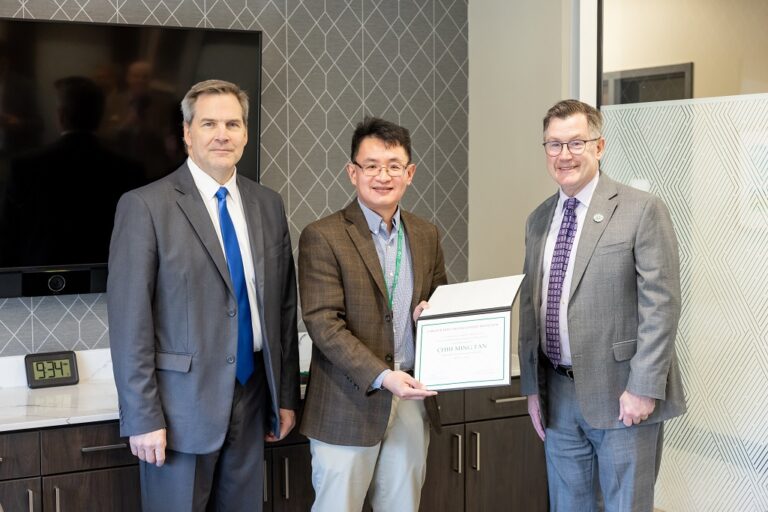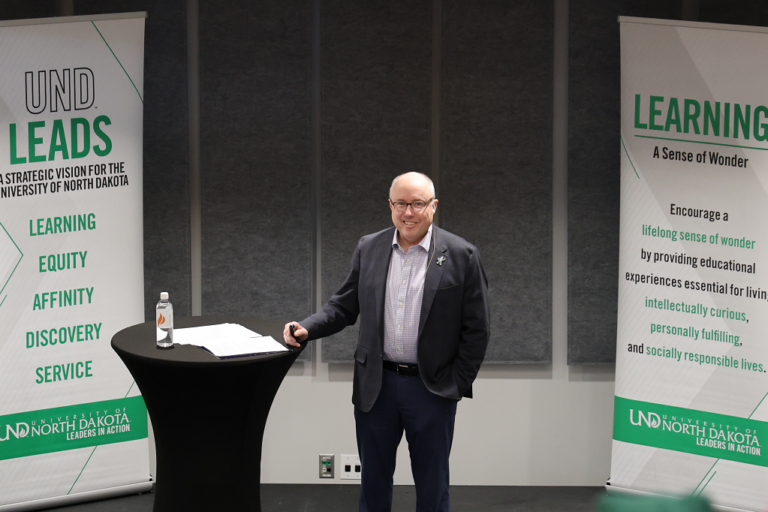New approaches for Honors
Revamped UND program presents two new pathways for student success

The new space in Columbia Hall’s southern atrium provides UND Honors with a fresh look.
New furniture, clean colors and cutting-edge technology stand ready for the next generation of high-achieving students.
Program Director Amanda Boyd and her team are in the midst of rolling out a new curriculum to pair with the new digs.
“We were looking for an opportunity to be innovative, but wanted to recognize that Honors education has a long tradition,” said Boyd, who’s been leading UND Honors for the past two years. “We wanted to recognize that, while also providing our students with an innovative second option.”
What they’ve crafted is an Honors Program that’s not only more relevant and flexible for students, but also one that branches out across disciplines on campus.
Fresh tracks
It involves two tracks: “Research Scholars” and “Leaders in Action.”
Research Scholars focuses on traditional liberal arts education to encourage students to think more critically and deeply about issues that interest them. It appeals to students from a wide variety of disciplines who want to sharpen their skills for goals like getting into top medical schools, graduate programs and law schools, according to Rebecca Rozelle-Stone, who as associate professor of philosophy is also an Honors Program Faculty Fellow. Her role over the past eight months has been to bring new visions and ideas in helping the program grow.

“Research Scholars is a changed set of curriculum from what was there previously,” she explained. While students may no longer declare Honors as a major, the requirements in which to graduate with the distinction of University Honors Scholar have been cleared of obstruction.
Before, incoming students would need to complete a “Sophomore Honors Portfolio” to be fully accepted into the program. The collection and organized submission of essays, research papers and reflections required a great deal of effort from both students and faculty.
“That was creating one more obstacle for them,” Rozelle-Stone said. “It was seen by a number of faculty and students as not helpful or pertinent in any kind of way. It kept some students from completing the Honors Program. Now, when students are accepted into the program, they’re in.”
To stay in the program, students must maintain a GPA of 3.2 and complete 24 Honors credits to receive the distinction at graduation, whether they’re in the Research Scholars or Leaders in Action track.
Another obstacle receiving adjustment is the senior thesis aspect of the program. It’s something Boyd looked to change since arriving in the director’s chair.
What used to be an all-consuming nine-credit thesis study — comparable to the work of master’s students, committee and all — has been revised to a three-credit project with four options of approach.
“It had limitations,” Boyd said of the old nine-credit model. “Not all disciplines can fit into that box, nor should they be asked to.”
While there’s still the thesis option, students can also complete work in civic engagement, creative and performative projects, or professional portfolios.
One example given by Boyd was a student looking to go to graduate school for film studies. She’s now writing a screenplay for her senior project, and Boyd’s making sure current students begin working on the new three-credit option as soon as possible.

High impact
The Leaders in Action track represents something new to the region (and potentially the nation) when considering Honors programs.
At its core, the new pathway enforces what’s already emphasized: service learning, experiential learning and civic engagement.
“What we’re going to do is focus on that and cultivate those leadership characteristics in our students,” Boyd said. “We’ll provide them with experiential opportunities that will expand and strengthen their skills and give them the necessary community connections to excel in their future careers.”
Rozelle-Stone characterized the Leaders in Action track as one that caters to the more public-natured students — those interested in politics, public service and entrepreneurship as opposed to those preparing for law or medical school.
“We’re exploring the creation of extremely unique signature experiences just for Honors students,” said Boyd, hinting at big things to come for not just Leaders in Action students but the entire program.
She and Associate Director Robin David have been in contact with entities around the community setting up shadowing opportunities, social entrepreneurship experiences and internships within UND exclusively open to Honors Program students.
Growing the tradition
Part of the new initiative involves expanding Honors credit-earning opportunities outside of the liberal arts. Boyd’s goal is to develop a pool of Honors-affiliated faculty across disciplines, creating a larger community.

“I want to bring in faculty who are known as excellent teacher-scholars,” she said. “I want the program to offer more. I want it to speak to the entire university and not just be the UND Honors Program, but the University Honors Program.”
Rozelle-Stone thinks this will also be a great way for Honors students to stay focused on their majors while earning a meaningful experience worthy of an Honors designation.
“We’re opening it up where faculty from across the university, who are deep in their own research specializing in different areas, are going to be teaching Honors classes,” she said. “It will be more tailored to students’ majors and interests than a set, limited-scope offering of Honors courses each semester.”
“As we move forward, things will be different,” Boyd stated. “But I am working now more closely with faculty in providing development opportunities so they can learn about the Honors approach and implementing high impact practices.”
Ultimately, she wants to ensure that the program still has the same student learning outcomes, the same rigor, and everything the program’s students already love.
“We hear about Leaders in Action all over campus,” she told UND Today. “I believe that the new Honors Program is going to exemplify Leaders in Action.”



